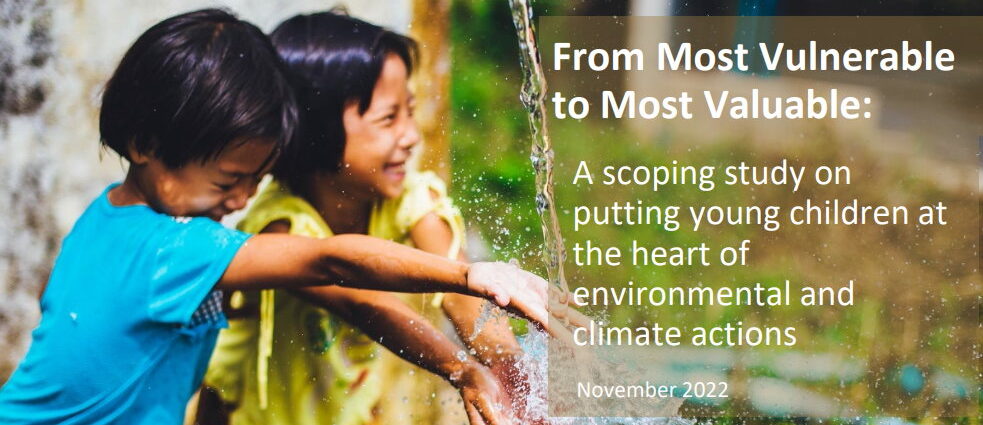In what ways do young children aged 0-8 in the Asia-Pacific region, as much as the rest of the world, disproportionately bear the impacts of the climate crisis? How do climate change and environmental degradation impacts erode the rights of the child and the fulfillment of the Sustainable Development Goals? What are strategic and practical entry points for making households and communities adapt to and resilient over time with child-centred policy systems that recognise specific developmental needs across early childhood stages? What investments are needed to support holistic and integrated nurturing care services for young children?
These questions have compelled the Asia-Pacific Regional Network for Early Childhood (ARNEC) to seek answers and define opportunities for action at the policy, programming, and investment pathways to put early childhood development (ECD) at the center of national, regional, and global resilience action. ARNEC, in partnership with Save the Children and UNICEF EAPRO, has embarked on a scoping study led by the University of Wollongong to inform its advocacy for ensuring a clean, safe, and sustainable environment for young children.
ARNEC is pleased to share with you the evidence from the Asia-Pacific region and the insights from experts and partners around the world exploring the deep interlinkages between climate change, environmental degradation and ECD to support the goal of enabling ECD systems and services for young children become more climate resilient, adequately funded, and their value better understood and considered by policy makers and climate scientists.
There are three components to the scoping study:
- Global Impacts Survey and Desk Review
- Sub-Regional Analysis and Case Studies
- Looking Forward: Recommendations and the Child-Centred Approach
Specifically, the scoping study recognises that there is currently insufficient attention given to the immediate and longer term needs of children in climate change and environmental actions. It leverages the nurturing care framework for ECD (NCF; WHO et al., 2018), a consensus model incorporating both the needs and rights of young children within their caregiving relationships, to better understand and communicate the impacts of climate change and environmental degradation (CC&ED) on ECD. The Study also elaborates a child-centred approach for governments, decision makers, development agencies, advocacy groups, and key stakeholders to support the incorporation of young children’s needs and rights when considering CC&ED impacts and responses, as well as adaptation and mitigation strategies. Through this process, examples of good practice and areas of innovation and challenges are identified and considered in relation to future planning.
Despite the diversity of information sources, expert views, and insights from Focus Group Discussion participants, and despite the richness of context specific information deriving from case studies and different regional settings, there were very consistent messages emerging from the Scoping Study. These include, but are not limited to:
- The nurturing care needs of young children need to be put at the heart of CC&ED actions; the current lack of focus on young children is causing them additional harms.
- To adequately respond to the nurturing care needs of young children and deliver on the commitments on the SDGs, it is necessary to differentiate meaningful differences in developmental stages and child characteristics, and to be specific about the ways in which young children’s nurturing care needs are impacted by current and anticipated CC&ED conditions; a systematic child-centred tool that incorporates the NCF and integrates ECD with CC&ED can potentially assist in this endeavour.
- Young children need to be seen as valuable participants in our environmental and climate response, and their education and knowledge needs to be cultivated and supported so that they build a strong sense of individual and collective agency to meet future challenges.
- Leadership is needed to re-conceptualise funding mechanisms and multisectoral collaboration so that financing and service delivery can be better coordinated to respond to contextual needs and variation, as well as anticipating future needs or challenges.
- Recognition that there is currently inadequate data to understand and document the impacts of CC&ED on young children or to form the basis for future data driven evaluation of policies and programs.
ARNEC hopes to connect with as many partners as possible to galvanise a coalition and a movement to move forward an agenda for an ECD-informed climate action. Our actions today shape our children’s future.
Related links
• Event: Launch of the scoping study
• Abridged version of the scoping study
• Summary brief
• Full version
• UNICEF EAPRO advocacy brief
• Thematic brief on clean, safe and secure environments





